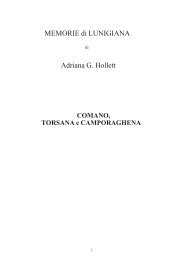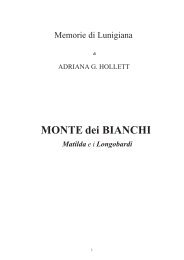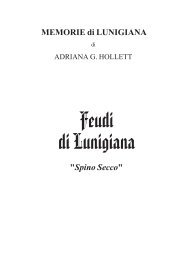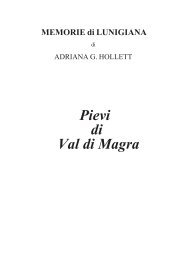Filattiera e la sua Pieve - Memorie di Lunigiana
Filattiera e la sua Pieve - Memorie di Lunigiana
Filattiera e la sua Pieve - Memorie di Lunigiana
Create successful ePaper yourself
Turn your PDF publications into a flip-book with our unique Google optimized e-Paper software.
Opizzino or Opizzone (1301), the second son of Federico (1264), “was the<br />
ancestor of the Marquis and Masters of Vil<strong>la</strong>franca”. His widow, Tobia<br />
Spino<strong>la</strong>, guar<strong>di</strong>an of his infant offspring, is worthy of mention as she who<br />
“composed, ordered and established” the STATUES for Aul<strong>la</strong> and other<br />
territories of hers. (The Statutes of Aul<strong>la</strong> of 1303 are preserved by Dott. Francesco<br />
Raffaelli and by Dott. Lorenzo Ferri of Bagnone (1)).<br />
It is important to note that even before the <strong>di</strong>vision of the Ma<strong>la</strong>spina<br />
territories of 1221, there were already in existence in their territories, the<br />
MUNICIPALITIES that were composed of a Consul, four or six Counsellors and a<br />
Massaro (farm overseer). The MAGISTRACY was made up of an Appeal Court<br />
Judge who was the Marquis, of a Podesta (high official), elected by the marquis, a<br />
Podesta’s Assistant, a Public Notary, a Courier and a Prison Custo<strong>di</strong>an. Each<br />
territory had its own Town Hall and all those of the territory formed the General<br />
Council.<br />
In the second Statue or Book, were annotated rules and regu<strong>la</strong>tions of civil<br />
rights; however, it is believed that there had to exist rules and regu<strong>la</strong>tions prior<br />
to these, avai<strong>la</strong>ble in written form or in inveterate use.<br />
Some of these regu<strong>la</strong>tions were: a woman in possession of a dowry was not<br />
allowed to inherit from her parents; a husband was not allowed to donate or leave<br />
anything at all in his will to his wife; in the sale of real estate, joint owners, <strong>di</strong>stant<br />
re<strong>la</strong>tives, neighbours were to have precedence; the loss of unexercised rights to<br />
real estate after twenty years, etc..<br />
In the third Book, were defined the transgressions and crimes punishable by<br />
corporal punishment or fines: flogging throughout the territory, banishment for<br />
life, decapitation, hanging and burning at the stake, the confiscation of<br />
possessions. Murder was punished by decapitation, adultery by a fine of twenty<br />
five liras for both men and women, rape by capital punishment, theft, rustling,<br />
felling of trees and removal of boundary stones by fines. Counterfeiting was<br />
punishable by being burnt alive, perjury by imprisonment and forgery by hanging.<br />
The crime of treason led to decapitation.<br />
These Books (four in all), were adopted by all the descendents of Federico<br />
Ma<strong>la</strong>spina throughout all of their Territories and Castles by all of the Men,<br />
Universities and Communities under their rule.<br />
10







